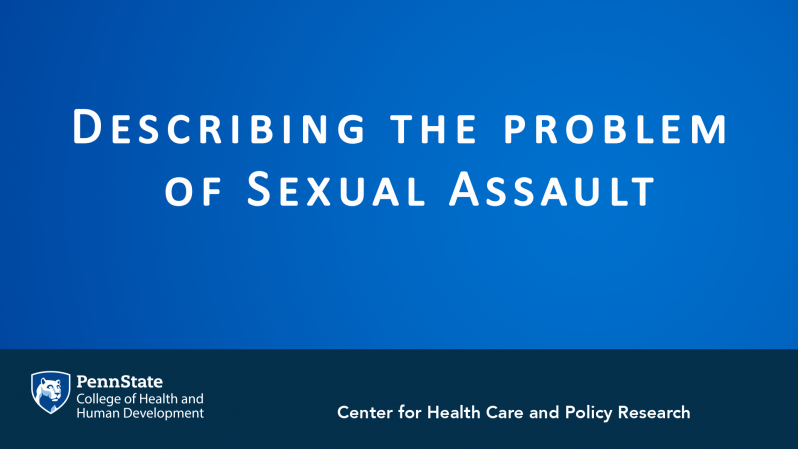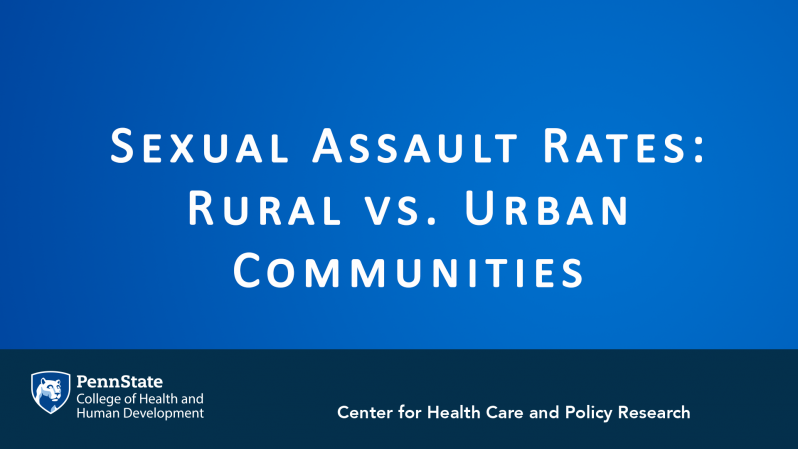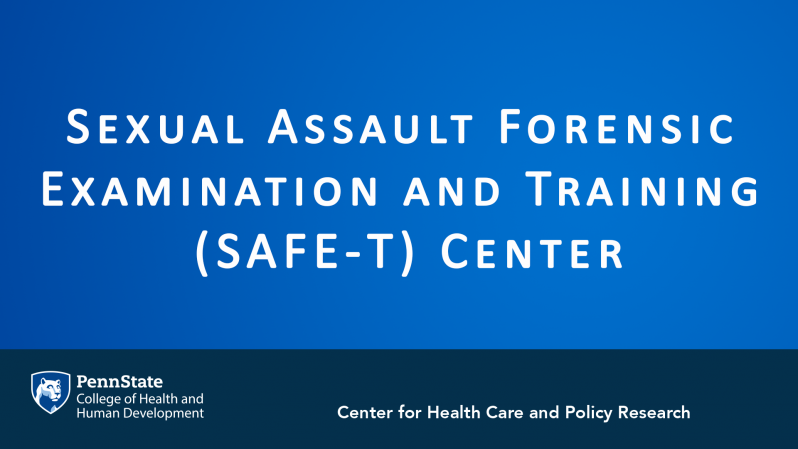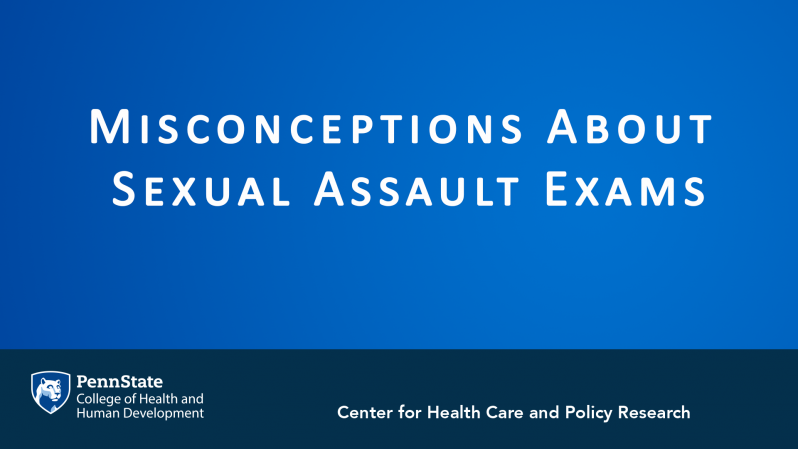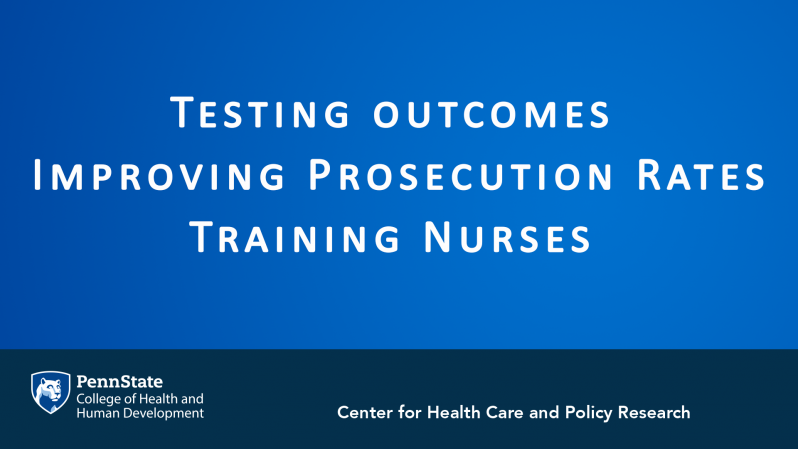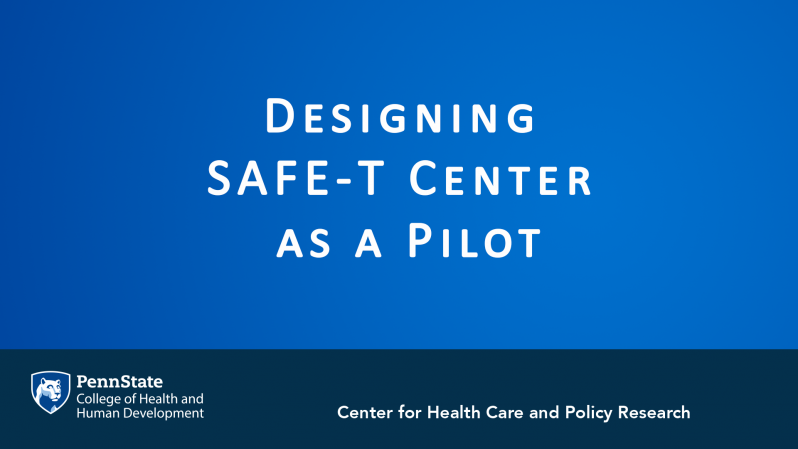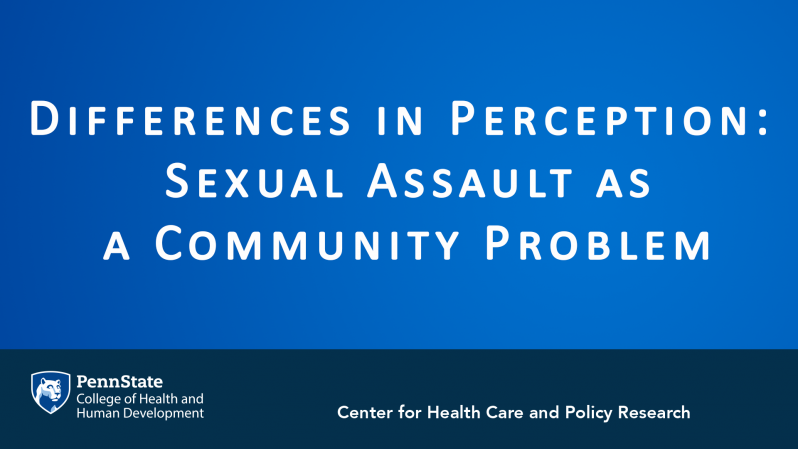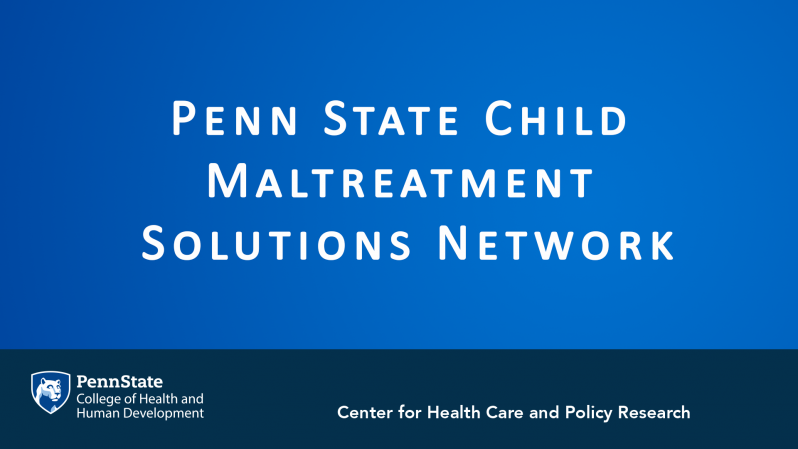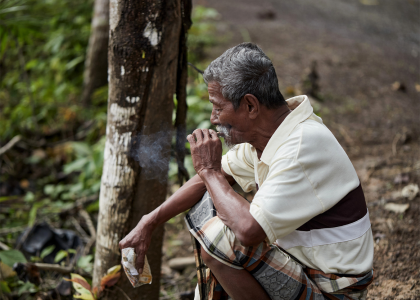Health Care’s Response to Sexual Assault in Underserved & Rural Communities
Ask the Experts
Sheridan Miyamoto, PhD, Penn State College of Nursing
In this discussion of our “Ask the Experts” series, Dr. Dennis Scanlon speaks with Dr. Sheridan Miyamoto, Assistant Professor, College of Nursing and Director of the Sexual Assault Forensic Examination and Training (SAFE-T) Center at Penn State, to discuss the problem of sexual assault and health care’s response in underserved and rural communities.
Funded by a $1.1 million U.S. Department of Justice, Office of Victims of Crime grant, the SAFE-T Center focuses on improving access to forensic sexual assault care for adult and adolescent victims in underserved communities. Through telemedicine, the SAFE-T Center aims to improve the quality of services provided to victims of assault in rural hospitals across Pennsylvania.
Interview Highlights
Describing the problem of sexual assault
“Sexual assault is a large problem in the United States. 60 percent of women and approximately 24 percent of men experience some sort of sexual violence in their lifetime. Approximately 300,000 people come forward alleging sexual assault has occurred each year…Ideally when someone does come forward having experienced trauma, we would have a really timely, and thoughtful, very skilled health care response both to address needs of injury, concerns about pregnancy, and sexually transmitted infections as well as to be able to attend to the emotional and psychological trauma someone has experienced…Finally people need to be really trained in how to in a defensible way collect forensic evidence to ultimately aid in prosecution of perpetrators.”
Understanding Unique Differences of Sexual Assault Rates in Rural vs. Urban Communities
“Research has shown that the rates are actually higher in rural communities than they are in urban settings…there are a number of enhanced stressors in rural communities. Generally a lack of education or lower educational attainment, lower socioeconomic status, people experience lots of stress when they don’t have job opportunities. Some of those very real factors often correlate to different levels of family violence and sexual violence.”
Sexual Assault Forensic Examination and Training (SAFE-T) Center at Penn State
“This is a Department of Justice Office of Victims and Crime funded initiative. It is a pilot project to begin with…to enhance access to high quality services in rural and underserved communities.”
Addressing range of needs following sexual assault
“There are great disparities when someone presents in an emergency department as to who might respond and whether they have gotten any training at all. The real problem is that very few people have gotten this training. It’s not part of medical education, it’s not part of core nursing education…so even when we do have people that have that training, they often then congregate around academic medical centers and urban settings. The ideal response would be that we have an expert in every single community who is able and ready to be there to respond to someone who has experienced this…sexual assault nurse examiners really have risen as a response to this, they are often called SANEs. They are registered nurses and nurse practitioners who have specialized advanced training in this area and really are able to respond and we know from research that they are very effective in improving physical and psychological outcomes for patients, as well as approved prosecution rates and better evidence collection.”
Training in rural communities and making expertise available
“It is important that we try and develop some local expertise everywhere it is needed. The problem is in rural communities, even if there is an emergency room nurse who says she will get the training and be that response, when she goes back, there is potentially no one there to mentor her…if we were really developing experts, they need to have a lot of mentoring on the job, because it is very technically difficult…and every case is quite different…it is difficult for someone that has that training to retain that level of expertise. An ideal partnership would be that they have someone at a distance to help mentor them and grow their expertise locally…ideally we would encourage more nurses to get base training, and then be able to support them by nurses that do this work on a regular basis…The response that is really ideal is if a person comes into the emergency department seeking care, is that the rural nurse would be able to access an expert through telehealth. If the patient consents to telehealth, then we can be with them live and participate in the interview and all aspects of the exam…It is really essentially having another colleague in the room without having to physically be in that location, so it allows us to have broad reach.”
Addressing Misconceptions about sexual assault exams
“If these exams are done by somebody who is really competent and very well-trained and well supported, this can really be the first step in somebody’s healing. The exams are not uncomfortable. They’re not painful. The patient maintains control over everything that happens along the way… it can really be a very positive experience and I think the public doesn’t have enough of a perception about how useful just coming and being able to ask questions of someone who has seen a lot of this and can explain.”
Retaining expertise in sexual assault examiners
“I think first is that it’s really fulfilling work, especially if you have colleagues that you can share some of that burden. It is emotionally difficult, but it’s also really rewarding. If we can support people and allow them to grow in their expertise and share their experience. We can do that in a number of ways. We can solve that again in using telehealth. We can offer the 24-7 live support, so you have a colleague that you’re working with. The gold standard in this work is peer review. So it’s important to create a network of colleagues that can share their experience…The other thing we can do then is bring all of the nurses that are at our pilot sites with our expert nurses together to share cases, talk about the challenges, talk about new evidence as it comes out and how we build in and enhance our evidence-based practice. All of those things reinforce that what they’re doing in their community is really valuable and important. And I do hope that it will ultimately sustain people in doing the work.”
Testing outcomes, Improving Prosecution Rates, and Training Nurses
“I think that it’s critical that we be able to develop something and demonstrate along the way whether it’s really the right solution. This work is really building on some other work that I conducted with colleagues at UC Davis where we did demonstrate a model that was similar for pediatric patients and were able to show that there were significant differences in quality when people had access to telehealth. The goal really here is can a similar model work for adolescents and adults, and looking at some new and different things. How will we sustain and grow a workforce so that we do have experts in every community? And in thinking about sustainability, we must demonstrate that it’s cost-effective, that we do improve quality, that we do enhance the pride that nurses have in their work and their ability to continue to do it because we’re offering the training that they tell us they need and we’re offering other sources of peer support and support for testimony and sorts of things that they might find challenging.”
“We’ll provide some models for how can we provide cost-effective training and then ultimately many nurses may leave the field. They may get this expensive training and then not feel supported enough to stay in the work so they may leave after a year…We can look at, are we able to attract more people to the field because they may know there’s a presence of the SAFE-T Center to support them as they go out and conduct live exams…I think we also want to look at the people who are coming in and receiving the service…How satisfied are they with their care?...ultimately need to look at the quality of the forensic evidence that’s collected. We’re working with crime labs across the state to do that, as well as looking at the photo documentation, as well as the written documentation and giving that to an outside expert and looking at that along with groups that don’t have access to telehealth.”
Improving prosecution rates and training nurses to be involved in legal process
“When we look at the numbers of people who are sexually assaulted, we might be inclined to think that there are a lot of perpetrators. But, what is more likely is that there some of those perpetrators are very prolific. If we are successful at prosecution, we may be successful at preventing another sexual assault… if we train nurses how to present their evidence-based practice and what they’re finding on exams and represent that well in courts, that’s another real area that we can have an impact and hopefully have an impact on prosecution.” “While the work itself may be difficult, it’s really quite daunting to be called into court to testify. It can be a scary environment. I’m working with a colleague here at Penn State who is in the Law School to develop a training that is really to immerse nurses in the courtroom process, to understand legal terms versus what are medical terms and to really help them feel confident about what their role is in the courtroom.”
Designing SAFE-T Center as a pilot
“We’re working with the Office of Rural Health because 48 of the 67 communities [in Pennsylvania] are rural so we have an abundance of hospitals to potentially choose from. We put out a survey asking these hospitals to respond if they’d like to be partners with us and had a really robust response. I think we had 21 hospitals in the initial survey respond that they would absolutely like to have this service. We went out and looked at those that met what we believe is a readiness scale…and we did some pilot site visits and really identified some great partnerships and trying to be selective about where there might be great need across the state…We hope to really quickly expand and be able to devise a telehealth solution that is fiscally responsible enough that the barrier for somebody to come to us would be low.”
Addressing differences in perception of whether sexual assault is a problem in a community
“People recognize that it exists in their community but I think if we build things and say that their hospital is ready to respond, we may really have an impact on how many more people say ‘my hospital has services for me and now that I’ve experienced something, I’m going to be more comfortable coming forward.’ I think we may see some movement in numbers of people that we can actually reach… I think it’s our duty on a larger level, and potentially at a state level, to say everyone should be able to come in and have really high quality care. Whether you go to an academic medical center, or you are in the most rural setting, that you should still have access to an expert, and, if it doesn’t exist in that community, we should be bridging that gap.”
Penn State Child Maltreatment Solutions Network
“Penn State had a great response to say that they wanted to bring researchers across different disciplines to all come in and actively be working on child maltreatment solutions…we were just successful in getting National Institutes of Health funding for a capstone center, which is really kind of an unprecedented opportunity to have the first national center focused on providing research and training in this area, so to that end I work teaching in the maltreatment and advocacy study minor…We bring undergraduate students from multiple disciplines together really to be thinking about child maltreatment before they ever leave Penn State…it’s another place where we can potentially grow the workforce and put people out who are actively understanding the problem and ready to be out in these more rural settings to work together to solve that…we also have a dissemination and outreach core and that’s something that I’m part of where we are building community collaborations, bringing in stakeholders, similar to what we’re doing in the SAFE-T Center, making sure that we have voices from the communities and understanding what do they feel are the most pressing child welfare needs to be solved. Then our research group is really trying to come up with demonstration projects… how do we solve some of these things and how can we best deliver evidence-based practice, how do we help communities evaluate what might be the right solution?”

